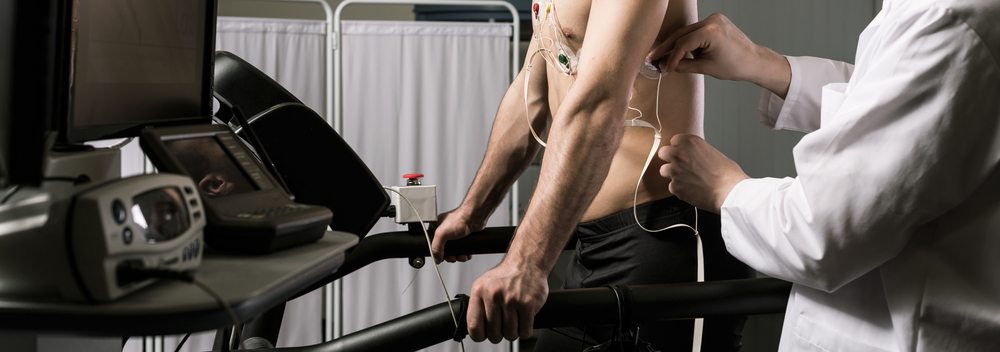
The Purpose of a Stress Test
A cardiac stress test assesses your heart function, level of fitness, and valvular function. Stress tests are used to identify the reason why your heart may not be functioning as it should, or why you’re feeling chest pain. At Midcoast Cardiovascular, stress tests are most commonly used to look for significant blockages of the arteries that provide blood flow and oxygen to your heart muscle. These are known as the coronary arteries. Stress tests can also be used to proactively assess your level of fitness prior to initiating an exercise program, or to check on any previous cardiac care or treatments.
There are two types of stress tests – one which requires exercise, and one in which a medication is used to simulate exercise. Due to equipment requirements and medication storage, chemical stress tests ordered by Dr. Ginkel are performed at the hospital’s outpatient cardiac center, however, if you are able to walk on a treadmill, your stress test will be done at Midcoast Cardiovascular’s office.
There are two types of tests performed at Midcoast Cardiovascular Associates. The first requires the use of only a treadmill, while the second type is called a stress echocardiogram. A stress echocardiogram provides an ultrasound map of your heart function before and after the treadmill stress test. Our treadmill stress test measures the rhythm of your heartbeat while you are hooked up to an ECG machine, both during activity and at rest. During these tests, Dr. Ginkel and/or a skilled technician will observe you closely.
When do I need to have a stress test?
Every patient, male or female, should have a stress test at some point, but especially if they experience chest pain or find they become excessively tired when engaging in exercise. Dr. Ginkel will let you know when and if you will need a stress test based on your medical history and consultation with him. As your lifestyle inevitably changes with the passing of time and advancing age, the condition of your heart muscle will also change. Should you decrease exercise, change your diet, or begin a sedentary job that reduces your regular daily activity, these factors can impact your cardiac health.
How do I prepare for my stress test?
Once your stress test is scheduled, Dr. Ginkel will let you know what you need to do to prepare ahead of time. It is a good idea to wear comfortable clothes and shoes, and avoid eating a heavy meal prior to the test. While these tests are called stress tests, we don’t want you to feel anxious about the outcome, but instead to feel comfortable and confident that you are in the competent hands of our experienced staff. As you would with any cardiology appointment, please write or print a list of your current prescription medications, supplements, and over-the-counter products (such as vitamins). It’s important that the doctor has a list of these medications ahead of time so he can best advise you on which (if any) medications should be discontinued before the stress test takes place. Continue to take your prescribed medications as directed before the test, unless you are told otherwise by Dr. Ginkel.
What Do I Need to Wear That Day?
These stress tests are not about fashion; they’re about your ability to perform the task at hand while being as comfortable as possible. You may be required to walk quickly or jog on the treadmill, so it’s best if you wear loose-fit clothing that allows you freedom of movement, as well as comfortable, fitted walking shoes.
How Stress Tests Are Performed
The technician will connect you to a heart monitor or ECG machine, with adhesive patches appropriately placed on your chest. Depending on which stress test Dr. Ginkel designates for you, the test may not require exercise. However, if you are scheduled for a stress test using the treadmill, you’ll be allowed to stretch and prepare by walking at a slow pace on the machine, which will gradually increase in speed and incline. In between each speed and/or incline increase, we will take note of your blood pressure, the pattern of your heartbeat compared to its resting rate, how tired you feel, and if you’re experiencing any chest pain.
Should the test be too much for you at any time, we will stop. Dr. Ginkel will be monitoring the entire session, and taking note of any symptoms you may experience so that he can compile a complete picture of your heart health.
The test should take no longer than one hour to both complete and discuss your results. Some portions of the test results may require a follow-up visit to weigh all outcomes and provide options for treatment methods.
At Midcoast Cardiovascular Associates, we make sure our patients are prepared and informed about every procedure in advance, so you know what to expect. In case you have further questions, you can call our office at any time to clarify. We go through the specifics of your upcoming stress tests, share any information you should be aware of, and inform you of the goal of this test. Call us today at 805-354-0112 to schedule your consultation with Dr. Ginkel, and find out how you can maintain a healthy heart and active lifestyle.
Recent Comments